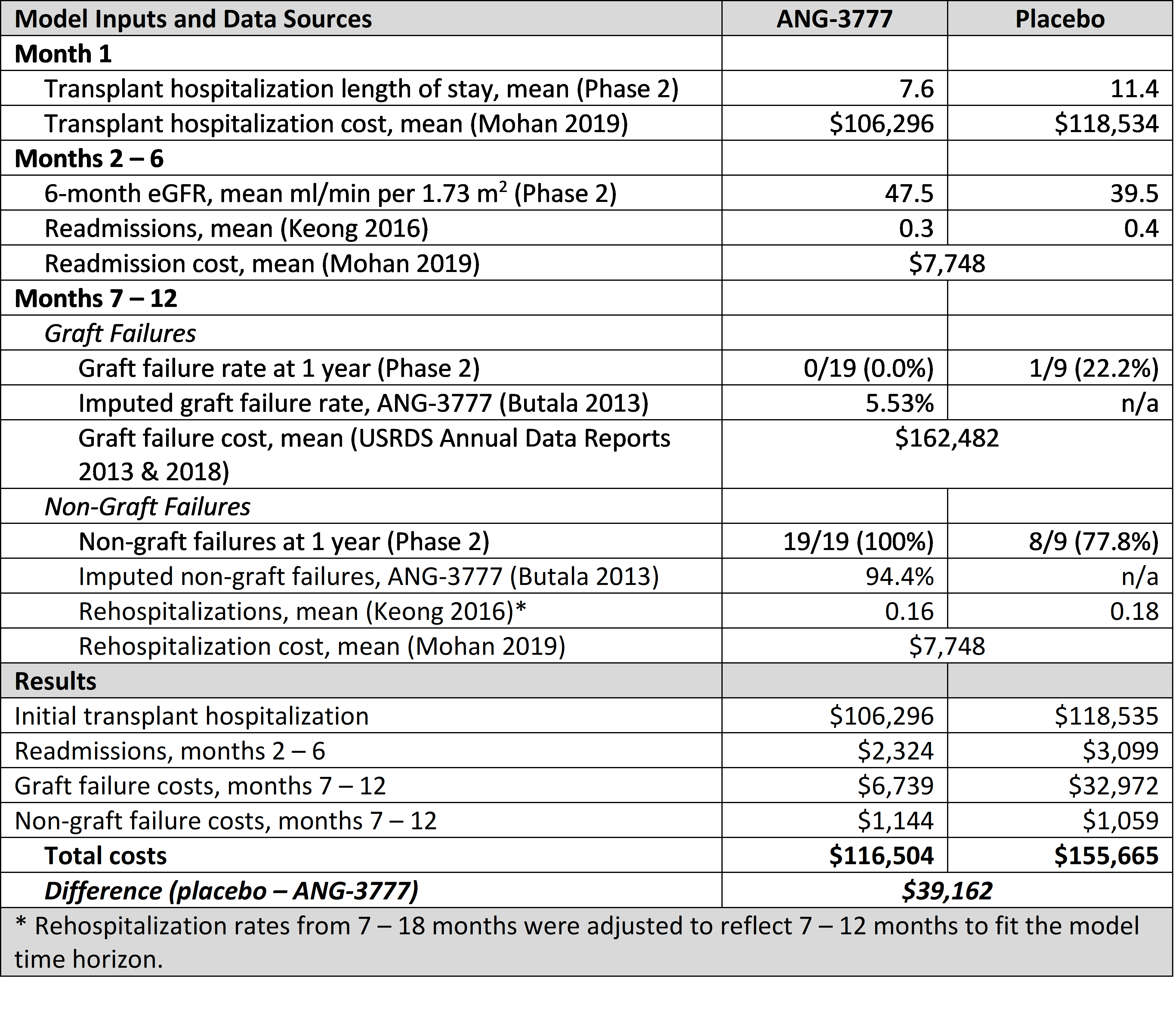Potential Cost-Savings Associated with ANG-3777 for the Treatment of Delayed Graft Function in Kidney Transplantation
1Medstar Georgetown Transplant Institute, Washington, DC, 2Angion Biomedica Corp, San Francisco, CA, 3Genesis Research, Hoboken, NJ
Meeting: 2020 American Transplant Congress
Abstract number: C-224
Keywords: Economics, Graft failure, Graft function, Kidney transplantation
Session Information
Session Name: Poster Session C: Non-Organ Specific: Economics & Ethics
Session Type: Poster Session
Date: Saturday, May 30, 2020
Session Time: 3:15pm-4:00pm
 Presentation Time: 3:30pm-4:00pm
Presentation Time: 3:30pm-4:00pm
Location: Virtual
*Purpose: We created a medical cost offset model based upon the results of a Phase 2, double-blind, randomized controlled trial of ANG-3777, a hepatocyte growth factor mimetic under development for the treatment of delayed graft function (DGF).
*Methods: A cost offset model from the perspective of a US integrated disease network with a 1-year time horizon was constructed and divided into 3 follow-up periods: Month 1 (including transplant hospitalization); months 2-6; months 7-12. Model inputs and assumptions are shown in the table. Transplant hospital days, graft failure rates, and eGFRs were collected from the Phase 2 trial for ANG-3777 and placebo patients. Month 2 to 12 hospitalizations were based on a Keong (2016) analysis of post-transplant hospitalizations stratified by eGFR, which were applied to the Phase 2 data. Costs were generated via a Premier Hospital Database cost analysis and the 2018 USRDS annual data report. We inflated graft failure in the ANG-3777 arm from 0 (observed in the trial) to 5.53% to reflect epidemiologic norms for non-DGF transplant patients.
*Results: Initial hospital, rehospitalization, and graft failure costs were higher in the placebo arm of the model. Non-graft failure 7-12 month hospitalization costs were slightly higher in the ANG-3777 arm, due to the fact that fewer patients experienced graft failure. The total cost offset associated with ANG-3777 in the first year after transplantation was $39,162.
*Conclusions: The Phase 2 study demonstrated that patients treated with ANG-3777 have shorter transplant hospitalization stays, higher eGFR at 28 days and 6 months, and lower incidence of graft failure. Applying standard costs for kidney transplant patients based on direct and eGFR-derived hospitalization rates produced a potential cost saving of $39,162 supporting further and expanded investigation of ANG-3777.
To cite this abstract in AMA style:
Cooper M, Mayne T, Kauf T, Gargano M, Freemyer K. Potential Cost-Savings Associated with ANG-3777 for the Treatment of Delayed Graft Function in Kidney Transplantation [abstract]. Am J Transplant. 2020; 20 (suppl 3). https://atcmeetingabstracts.com/abstract/potential-cost-savings-associated-with-ang-3777-for-the-treatment-of-delayed-graft-function-in-kidney-transplantation/. Accessed June 30, 2025.« Back to 2020 American Transplant Congress

